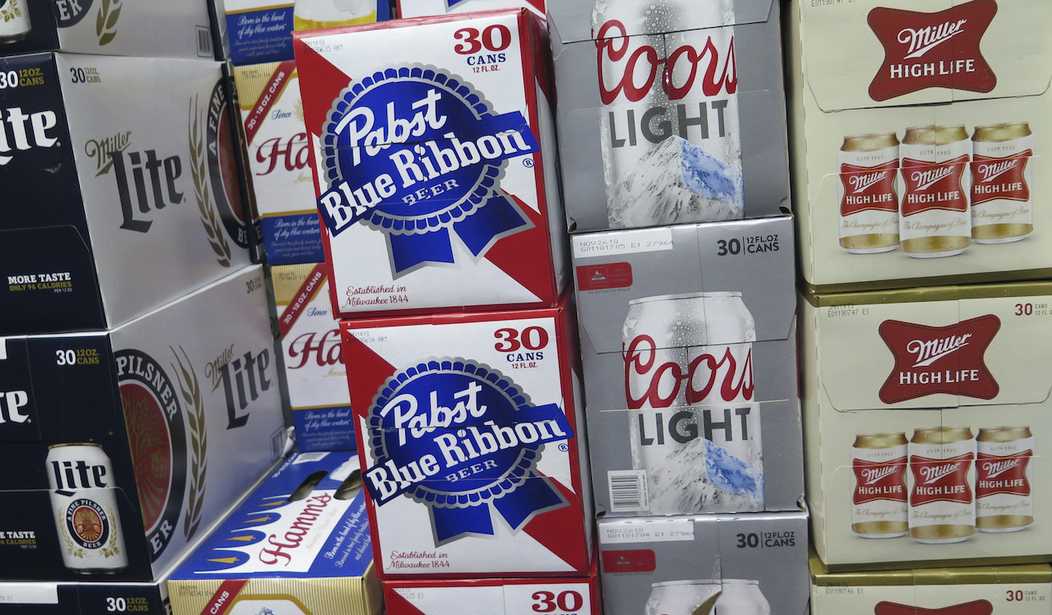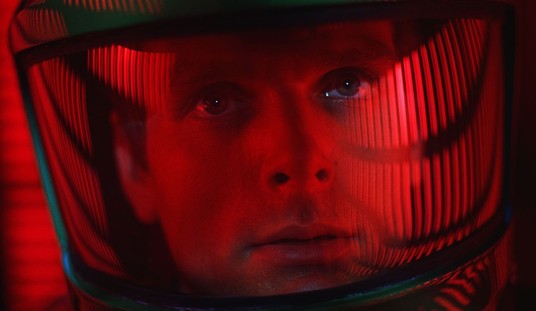Homer Simpson, Norm Peterson, Billy Carter, John Madden: There was a time when the world’s most beautiful men were all beer drinkers. It was an age of peace and prosperity when a cold, frosty beer in your paw was your God-given reward for a hard day’s work on a Friday evening. (Or an early Monday morning if you’re unemployed.)
Beer was our all-American staple — the generational constant that seamlessly connected fathers with sons, sons with fathers, and, come closing time, ugly people with slightly less ugly people. It was Daddy’s “happy juice” that (along with gambling) made football more interesting.
It was so culturally ingrained that nobody could fathom its fandom going… flat. After all, beer was the semi-official drink of the American adult (or near-adult, if mom’s not around). But today, its sales haven’t just gone flat — they’re evaporating:
Beer shipments are at their lowest level in a quarter-century. The craft beer industry had negative production for the second year in a row. We’re approaching last call for alcohol.
And as bad as it already is, it’s about to get worse: 41 percent of consumers intend to drink even less in 2024.
Blame Gen Z. They were the ones who invented the “sober conscious” craze that somehow views beer as an inebriant (fair) but not marijuana (wtf?). They’re the generation that’s gone Eliot Ness on the alcohol industry. A June 15, 2024, Newsweek article titled “Gen Z is Abandoning Alcohol” reported that 64 percent(!) of legal-aged Gen Zers haven’t had a single drop of alcohol in the last six months.
And 69 percent of Gen Zers prefer marijuana to alcohol.
If “The Simpsons” was being developed anew and meant to reflect America circa 2024, Homer would no longer be chugging that delicious Duff Beer — he’d be sneaking around Marge with a vape pen. Moe’s wouldn’t be a bar; it’d be a dispensary (or maybe a “tea” shop). Poor Duffman would be jobless.
It’s foreboding: As Walter Cronkite used to say, if you’ve lost Homer Simpson, you’ve lost America.
How did this happen?
When did the beer drinkers lose the culture war to the pot dweebs?
One minute, beer was ubiquitous. When you got to college, you’d attach an IV of Natty Light (and/or Milwaukee’s Best) to your arm and go get yourself an education. Then, when you’d go to a baseball game, you’d grab yourself a beer. Or four. (Why not? Their logo’s all over the stadium anyway.) Maybe afterward, you’d hit one of those nice, high-end restaurants like an Applebee’s or a Chili’s (where they microwave your food good and fresh) and indulge in their two-for-one beer deals. Beer was like your shadow: It followed you everywhere.
But not anymore.
We’ve lost. All the top tastemakers, influencers, trendsetters, and performers that younger Americans care about are Team Weed. They lapped us when nobody was looking, and now they’re light-years ahead. And they’re better educated, too: The pot scientists are working feverishly in the lab, designing crazy new breeds and inventing new strains — from gummies to candies to chocolates to mints to sodas, they’re engineering wildly innovative ways to consume MJ.
Meanwhile, the best beer breakthrough we’ve had in 20 years is that stupid beer can that turns blue when cold.
It’s a shame. There’s something about a beer-drinking culture that promotes fraternity, brotherhood, faith, and family (as well as violence, mayhem, danger, and crime, but hey, nobody’s perfect). Beer brings people together. You and your coworkers are just two strangers, but once you get sloppy drunk on a Tuesday, you guys are best friends for life. You might even wake up with matching tattoos.
Alcohol is an inherently extroverted vice; it’s outgoing in a way that weed will never be. When you drink, you bond with others. When you get stoned, you bond with yourself.
Some drugs are considered “complementary products” because they’re strongly associated with certain behaviors, objects, and activities (i.e., lighters are a complementary product to cigarettes). Well, alcohol is a complementary product to parties with lots of people, sports, and flirting with the opposite sex.
Marijuana is a complementary product for programming (alone) all day and playing video games (alone) all night.
Alcohol is a social lubricant. Marijuana is a social avoidant. But that’s the ethos of our younger generation — and the biggest change in our culture:
The Baby Boomers were a highly social generation because there were a zillion of them. They had to cooperate, and because they were so numerous, those who couldn’t cooperate were frozen from the workforce.
Gen X was also a social generation: We were latchkey kids. We had to amuse ourselves by leaving our homes and making random friends. (There’s nothing fun to do in a pre-Internet home anyway, except watch reruns of “Saved by the Bell” and stare at blurry images on that adult station your parents won’t subscribe to.)
The Millennials are another social generation. (They’re also about to hit 4-0 and experiencing mid-life angst for the first time, which is HILARIOUS to watch. Plus, now that they’re balding, most of those goofy manbuns have finally gone away.) They’re even more numerous than the Baby Boomers and tend to be highly proficient at teamwork. For the next 20 years, they’re the ones who’ll run the workplace. I think we’ll be okay.
Gen Z, on the other hand, is smaller and introverted. They don’t talk; even before COVID, they refused to talk. They absolutely won’t work together! In fact, their dream Saturday night is locking their bedroom door and playing with their phones until 3 a.m. This is the generation that, when all is said and done, will permanently alter the course of our culture.
Ding-Ding! It’s closing time for a certain era in America.
“It was a very good year.”










Join the conversation as a VIP Member